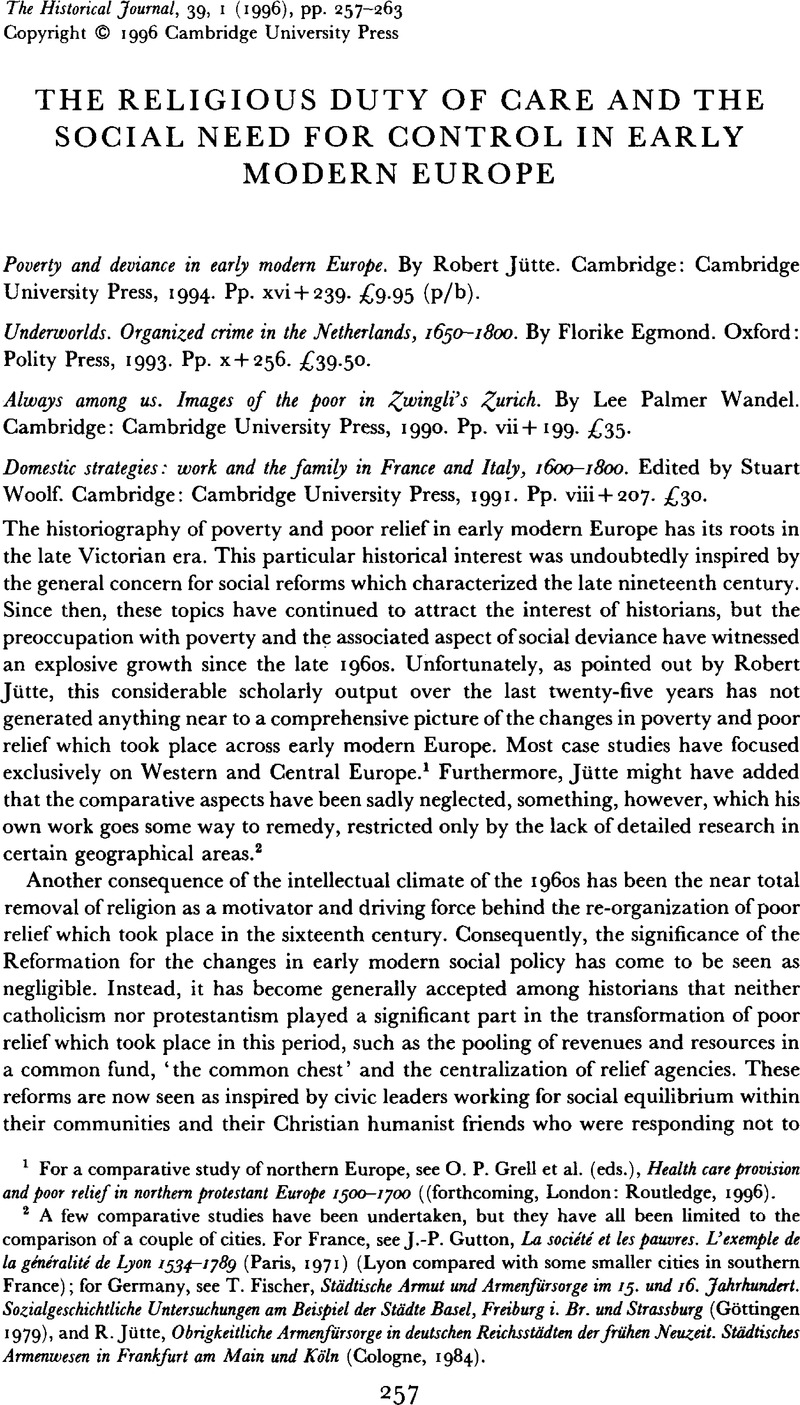Published online by Cambridge University Press: 11 February 2009

1 For a comparative study of northern Europe, see Grell, O. P. et al. (eds.), Health care provision and poor relief in northern protestant Europe 1500–1700 ((forthcoming, London: Routledge, 1996).Google Scholar
2 A few comparative studies have been undertaken, but they have all been limited to the comparison of a couple of cities. For France, see J.-P., Gutton, La société et les pauvres. L'exemple de la généralité de Lyon 1534–1789 (Paris, 1971)Google Scholar (Lyon compared with some smaller cities in southern France); for Germany, see Fischer, T., Städtische Armut und Armenfursorge im 15. und 16. Jahrhundert. Sozialgeschichtliche Untersuchungen am Beispiel der Städte Basel, Freiburg i. Br. und Strassburg (Göttingen 1979)Google Scholar, and R., Jütte, Obrigkeitliche Armenfürsorge in deutschen Reichsstädten der frühen Neuzeit. Städtisches Armenwesen in Frankfurt am Main und Köln (Cologne, 1984).Google Scholar
3 Davis, N. Z., ‘Poor relief, humanism and heresy’Google Scholar, republished in Davis, N. Z., Society and culture in early modem France (Stanford, 1975), pp. 17–64.Google Scholar
4 See Pullan, B., Rich and poor in Renaissance Venice (Oxford, 1991)Google Scholar; Lis, C. and Soly, H. (eds.), Poverty and capitalism in pre-industrial Europe (Hassocks, Sussex, 1979)Google Scholar; and Slack, P., Poverty and policy in Tudor and Stuart England (London, 1988).Google Scholar
5 A few dissenting voices have been heard, see Grimm, H. J., ‘Luther's contributions to sixteenth-century organization of poor relief’, Archiv für Reformationsgeschichte, VI (1970), 222–34Google Scholar and Lindberg, C., ‘“There should be no beggars among christians”: Karlstadt, Luther and the origins of protestant poor relief’, Church History, XLVI, no. 3 (1977), 313–34CrossRefGoogle Scholar. Both Grimm and Carter Lindberg, however, concentrate on Luther's influence and theological rationale for encouraging changes in poor relief.
6 Brigden, S., London and the Reformation (Oxford, 1989), pp. 477, 481–2.Google Scholar
7 See for instance Pullan, B., ‘Catholics and the poor in early modern Europe’, Transactions of the Royal Historical Society, 5th Series, XXVI (1976), 21Google Scholar, and Brigden, , London, p. 482.Google Scholar
8 As pointed out by Pullan, , ‘Catholics and the poor’, p. 34.Google Scholar
9 For a discussion of the implications of the doctrine of the ‘Priesthood of all believers’, see Cameron, E., The European Reformation (Oxford, 1991), pp. 148–51.Google Scholar
10 R., Jütte, ‘Poor relief and social discipline in sixteenth-century Europe’, European Studies, XI (1981), 25–52Google Scholar, and Jütte, , Poverty and deviance, especially, p. 198Google Scholar. Lis, and Soly, (eds.), Poverty and capitalism in pre-industrial Europe, especially, pp. 82–96.Google Scholar
11 Jütte, , ‘Poor relief’, p. 29.Google Scholar
12 See my forthcoming, ‘Religious and cultural background for the changes in health care and poor relief in early modern, northern Europe’, in Grell, et al. (eds.), Health care provisions.Google Scholar
13 For this suggestion, see Woolf, S. (ed.), Domestic strategies, p. 15.Google Scholar
14 See Beattie, J. M., ‘The pattern of crime in England, 1660–1800’, Past and Present, LXII (1974), 47–95CrossRefGoogle Scholar, and Hay, D., ‘War, dearth and theft in the eighteenth century: the record of the English courts’, Past and Present, XCV (1982), 117–60.CrossRefGoogle Scholar
15 Jones, C., The charitable imperative: hospitals and nursing in ancien régime and revolutionary France (London, 1989).Google Scholar
16 Underdown, D., Fire from heaven. Life in an English town in the seventeenth century (London, 1992).Google Scholar